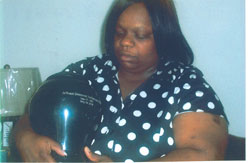
It is a haunting experience to be in the presence of a mother who has lost her child. Lyvonne Cargill’s pain is evident in the quiet disarray of her home, which she graciously though unnecessarily apologizes for. And it speaks through the windows of her eyes that tell of restless nights, excruciating loss, burning anger, and yes, retributive justice.
In the living room of her east side Detroit home there are two large green potted plants on a coffee table that seem to dominate the room. There is also a large black vase that rests near the edge of the table close to where she sits facing me. It is the urn that contains the remains of her 17-year-old son Je’Rean Blake’s ashes.
Cargill has lived the day, the hour and the moment when she lost her son to an incredible act of wanton violence when a 34-year-old man, Chauncey Owens, reportedly became enraged with the way Je’Rean looked at him and left to return with a gun which he used to shoot Je’Rean through the heart.
This incident led to the death of 7-year-old Aiyanna Jones by an officer’s bullet as Detroit police raided her home in search of Owens.
Aiyanna’s family has retained attorney Jeffery Fieger and has filed a lawsuit against the city. And although many are of the opinion that the police are solely to blame for Aiyanna’s death because of their military-style raid and apparent disregard for the lives of children and other occupants, Cargill is very clear on who she believes shoulders the brunt of the blame. Her opinion is rooted deep within the sensibilities of a mother who will probably never understand why she had to lose her son. It is Chauncey Owens and the adult members of the Jones family that she believes harbored him and colluded with him.
“He took my son’s life away,” she says in a voice racked with indignation. “He’s not feeling me. He’s not feeling my pain. That includes Charles Jones. None of that family is feeling my pain.”
Charles Jones is Aiyanna’s father, and Lavonne believes he was with Owens in the SUV that Owens used to drive back to the store on Mack and St Jean to gun down Blake. According to a homicide investigator assigned to the case, Owens confessed that Jones and at least two other men rode along when he went to shoot Blake.
“I feel that all of the people in the SUV should go to prison too because that’s accessory to murder. They knew what he was planning on doing and they could have stopped it. They could’ve got out of the car and called the police or something, but they didn’t do that.”
Cargill says that her son, Je’Rean, is still with her in spirit. That he sometimes talks to her and inspires and encourages her beyond the awesome barrier that separates the living from the dead. It was Je’Rean she swears that came to her in a vision and told her that Owens had been arrested. “I was asleep on that Sunday morning when the police raided the Jones house,” she said. “Je’Rean came to me and said ‘Mama, let’s go!’ I said ‘OK, Je’Rean,’ and I got up and jumped in my car and he said, ‘Ride down Lillibridge!’ I did that and when I got to the area I saw a man and a woman out there and they told me that the police got the guy that shot the boy on Mack and St Jean. I asked them what is the guy’s name, they said ‘Chauncey’ and I said ‘That’s the man that killed my son’ and I just pulled off.”
Cargill is speaking out of a place that most people have never had to reach into. Is it her imagination fueled by insurmountable loss that allows her to hear, to see and to talk to Je’Rean beyond the grave? Whatever it is, she speaks with the conviction of the true believer.
“Sometimes he visits me,” she said. “He will stand outside and say, ‘Ma, open the door, Ma. Where you at, Ma? Who got your car, Ma?’ When I’m at work he calls me to see how I’m doing or asks me to bring him something. And whatever it is he asks for, I bring it home.”
And yet the violence in Detroit and in cities across America continues to erupt in frightening and incomprehensible episodes. The mitigating factors almost as numerous and elusive as the quality and quantity of the vehement outrages that are sadly a part of our society and our psyche.
“The constant increase in Black-on-Black violence and criminality reflects the constant incremental generation by prevailing socioeconomic conditions of Black hostility and anxiety fueled by a constantly increasing sense of futility,” writes Professor Amos N. Wilson. “Thus Black-on-Black violence and criminality are danger signals, flashing red indicators of explosive social inequalities, dysfunctionalities, dislocations and conflicts. They are alarming reminders that the White American-dominated body politic is diseased, in danger of cardiac arrest, and in need of radical surgery and intensive care.”
Even so, parents like Lyvonne Cargill no longer need reminders. What has happened to them and their loved ones they will never forget.
Steven Malik Shelton is a writer and human rights advocate. He can reached at malikshelton19@aol.com
